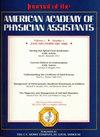乳房密度对乳腺癌筛查的影响。
IF 0.8
4区 医学
Q3 MEDICINE, GENERAL & INTERNAL
Jaapa-Journal of the American Academy of Physician Assistants
Pub Date : 2024-10-01
Epub Date: 2024-09-24
DOI:10.1097/01.JAA.0000000000000127
引用次数: 0
摘要
摘要:极度致密的乳房可能是乳腺癌的独立危险因素。美国食品和药物管理局(FDA)的一项新规定要求告知患者他们的乳房密度以及额外的成像检查对筛查乳腺癌可能带来的益处。临床医生应了解有关乳腺癌风险、乳房密度的数据,以及如果患者(尤其是绝经前女性)的乳房密度极高但无其他已知风险因素,应改变筛查技术的建议。本文章由计算机程序翻译,如有差异,请以英文原文为准。
Implications of breast density for breast cancer screening.
Abstract: Extremely dense breasts can be an independent risk factor for breast cancer. A new FDA rule requires that patients be notified of their breast density and the possible benefits of additional imaging to screen for breast cancer. Clinicians should be cognizant of the data about breast cancer risk, breast density, and recommendations to change screening techniques if patients, particularly premenopausal females, have extremely dense breasts but no other known risk factors.
求助全文
通过发布文献求助,成功后即可免费获取论文全文。
去求助
来源期刊

Jaapa-Journal of the American Academy of Physician Assistants
MEDICINE, GENERAL & INTERNAL-
CiteScore
1.20
自引率
9.10%
发文量
310
期刊介绍:
JAAPA is the peer-reviewed clinical journal of the American Academy of Physician Assistants (AAPA). Published for more than 25 years, its mission is to support the ongoing education and advancement of physician assistants (PAs) by publishing current information and research on clinical, health policy, and professional issues.
Published monthly, JAAPA''s award-winning editorial includes:
-Clinical review articles (with AAPA-approved Category I CME in each issue)-
Case reports-
Clinical departments-
Original health services research-
Articles on issues of professional interest to PAs
 求助内容:
求助内容: 应助结果提醒方式:
应助结果提醒方式:


